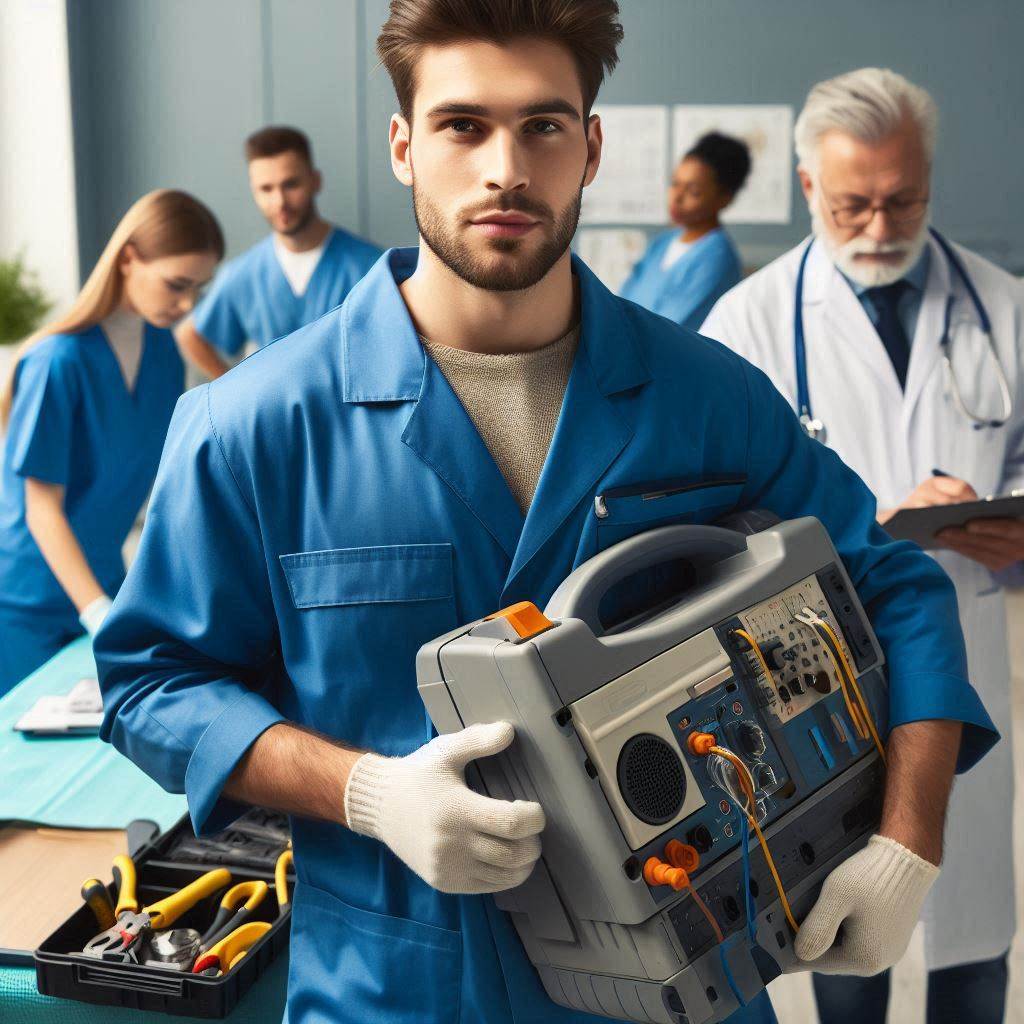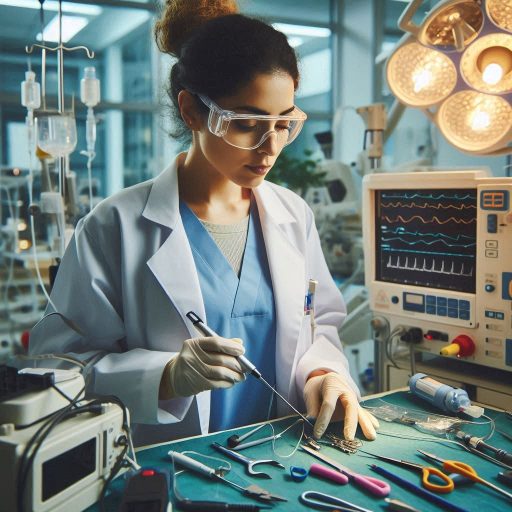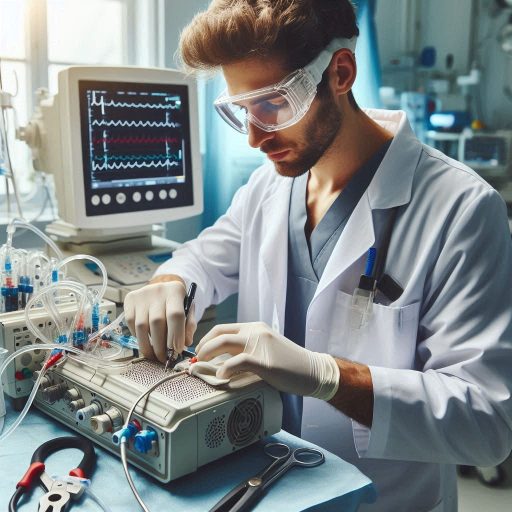Introduction
Biomedical equipment technicians are professionals responsible for maintaining, repairing, and troubleshooting medical equipment used in healthcare facilities.
Their role is crucial in ensuring that medical devices are functioning properly to provide accurate diagnosis and treatment for patients.
Technical Skills
Proficiency in electronics, mechanical skills, and computer literacy are essential for biomedical equipment technicians to troubleshoot and repair complex medical equipment accurately.
Attention to Detail
Being meticulous and detail-oriented is important as even the smallest error in maintaining or repairing medical equipment can have serious consequences for patient care.
Problem-Solving Abilities
Biomedical equipment technicians must possess strong problem-solving skills to quickly identify and address issues with medical equipment to minimize downtime and ensure patient safety.
Communication Skills
Effective communication with medical staff and equipment manufacturers is necessary to convey technical information and collaborate in resolving equipment issues efficiently.
Adaptability and Flexibility
Given the ever-evolving nature of medical technology, biomedical equipment technicians must be adaptable to new equipment and technologies that they encounter in their work.
Organization and Time Management
Managing a diverse workload of equipment maintenance and repairs requires good organizational skills and the ability to prioritize tasks to meet deadlines and minimize disruptions in patient care.
Continuous Learning
Staying updated with the latest advancements in medical technology through ongoing training and professional development is crucial for biomedical equipment technicians to provide high-quality service.
Formal Education and Training
Top Skills Needed for Biomedical Equipment Technicians
When it comes to ensuring medical equipment is functioning properly and efficiently, biomedical equipment technicians play a crucial role.
These professionals are responsible for installing, maintaining, and repairing medical equipment used in healthcare settings.
To excel in this field, individuals must possess a unique set of skills that allow them to perform their duties effectively.
Below are some of the top skills needed for biomedical equipment technicians:
Technical Aptitude
Biomedical equipment technicians must have a strong understanding of electronic systems, computer technology, and medical equipment.
They need to be able to troubleshoot and diagnose issues accurately to ensure equipment is functioning properly.
Attention to Detail
Precision is key when working with medical equipment.
Technicians must pay close attention to detail to spot even the smallest issues that could affect the performance of the equipment.
This skill is essential for maintaining high standards of accuracy and safety.
Problem-Solving Skills
Biomedical equipment technicians are often tasked with resolving complex issues that arise with medical equipment.
They must be able to think critically and analytically to identify the root cause of problems and develop effective solutions.
Communication Skills
Effective communication is essential for biomedical equipment technicians to interact with healthcare professionals, equipment vendors, and other team members.
Technicians must be able to explain technical information clearly and concisely to ensure everyone is on the same page.
Analytical Thinking
Having strong analytical skills allows technicians to assess and evaluate equipment performance data.
By analyzing trends and patterns, technicians can anticipate potential issues and take proactive measures to prevent equipment failures.
Time Management
In a fast-paced healthcare environment, technicians must be able to prioritize tasks, manage their time effectively, and meet deadlines.
Being able to juggle multiple responsibilities efficiently is crucial for success in this role.
Adaptability
As technology continues to evolve, biomedical equipment technicians must be adaptable and open to learning new skills.
They need to stay updated on the latest advancements in medical equipment and be willing to undergo training to enhance their capabilities.
Mechanical Skills
A solid foundation in mechanical engineering is beneficial for biomedical equipment technicians.
Understanding how mechanical components work together and being able to perform hands-on repairs and maintenance is a valuable skill in this profession.
Regulatory Compliance
Technicians must be knowledgeable about regulatory standards and guidelines that govern the use and maintenance of medical equipment.
This includes understanding how to ensure equipment is in compliance with industry regulations to guarantee patient safety.
Teamwork
Collaboration is key in healthcare settings, and biomedical equipment technicians often work as part of a multidisciplinary team.
They must be able to work effectively with other healthcare professionals to ensure seamless integration of medical equipment into patient care processes.
In a nutshell, biomedical equipment technicians play a crucial role in maintaining and ensuring the proper functioning of medical equipment in healthcare settings.
By possessing a diverse set of skills ranging from technical aptitude to communication and teamwork, technicians can excel in their roles and contribute to the delivery of quality patient care.
Read: Importance of Accuracy in Surveying and Mapping
Transform Your Career Today
Unlock a personalized career strategy that drives real results. Get tailored advice and a roadmap designed just for you.
Start NowTechnical Skills
Ability to Troubleshoot and Repair Complex Medical Equipment
Biomedical equipment technicians must excel in troubleshooting and repairing complex medical devices.
This skill is crucial for ensuring that hospitals and clinics run smoothly.
Technicians often face intricate challenges when dealing with malfunctioning equipment.
They need to diagnose the problem quickly and efficiently to prevent downtime in patient care.
The ability to understand the inner workings of these machines allows technicians to identify issues accurately.
By mastering this skill, they help maintain the reliability of life-saving devices.
Moreover, it minimizes costly delays and enhances patient safety, making this ability indispensable in their daily work.
Understanding of Electrical and Electronic Systems
A deep understanding of electrical and electronic systems is fundamental for biomedical equipment technicians.
These systems are the backbone of most medical devices, and a solid grasp of them is essential.
Technicians need to be familiar with circuitry, microprocessors, and software that power medical equipment.
This knowledge enables them to perform routine maintenance and address any electrical faults.
Additionally, staying updated on the latest advancements in electronic technology is vital.
As medical devices evolve, technicians must adapt to new technologies and integrate them into their expertise.
This understanding ensures they can handle the complexities of modern medical equipment.
Mastering both troubleshooting complex medical equipment and understanding electrical and electronic systems forms the core of a successful biomedical equipment technician‘s skill set.
These technical skills ensure that medical facilities operate without interruption and that patient care is never compromised.
Read: Surveying and Mapping Technician: Job Satisfaction
Communication Skills
Biomedical Equipment Technicians (BMETs) play a critical role in healthcare settings by ensuring medical equipment functions properly.
To excel, BMETs must possess strong communication skills, which are vital for interacting with healthcare professionals and vendors, as well as documenting maintenance and repair procedures.
Ability to Effectively Communicate with Healthcare Professionals and Vendors
BMETs must communicate effectively with healthcare professionals and vendors to ensure the proper functioning of medical equipment.
Clear communication allows BMETs to understand the needs of healthcare staff, ensuring that the equipment they maintain or repair meets specific requirements.
For example, a BMET must accurately convey technical information to a nurse or doctor who may not be familiar with the intricacies of the equipment.
This ensures that the medical staff can operate the equipment safely and effectively.
Moreover, BMETs often work closely with vendors who supply and service medical devices.
Effective communication with vendors is essential for ordering parts, understanding technical specifications, and troubleshooting equipment issues.
A BMET who can clearly articulate their needs and understand vendor responses will be more efficient in maintaining the equipment, ultimately contributing to better patient care.
This skill is especially important when dealing with new or complex equipment, where precise communication can prevent misunderstandings and ensure that the right parts or services are provided.
Documenting Maintenance and Repair Procedures
Accurate documentation of maintenance and repair procedures is another crucial aspect of a BMET‘s role.
Keeping detailed records ensures that equipment maintenance is consistent and reliable.
These records are essential for tracking the history of each piece of equipment, identifying recurring issues, and planning future maintenance schedules.
Proper documentation also helps in ensuring compliance with regulatory standards, which require thorough records of all maintenance and repairs performed on medical devices.
When documenting maintenance and repair procedures, BMETs must be meticulous, noting every detail, from the issue reported to the steps taken to resolve it.
This documentation serves as a reference for future repairs, allowing BMETs to identify patterns or recurring problems.
It also provides a clear record for healthcare facilities, which is essential for audits and inspections.
Additionally, well-maintained records can assist in training new BMETs, offering them insight into the specific equipment they will be working with and the common issues they may encounter.
In essence, communication skills are paramount for BMETs.
The ability to effectively communicate with healthcare professionals and vendors, coupled with precise documentation of maintenance and repair procedures, ensures that medical equipment remains in optimal condition.
These skills not only enhance the efficiency of BMETs but also contribute significantly to the overall safety and quality of patient care.
Read: Online Courses for Surveying and Mapping Technicians

Attention to Detail
Biomedical equipment technicians must possess a high level of attention to detail in order to effectively maintain and repair medical equipment.
This skill is essential in ensuring the accurate functioning of equipment that is crucial for patient care.
Here are some key reasons why attention to detail is a top skill needed for biomedical equipment technicians:
Precision in working with sensitive medical equipment
Biomedical equipment technicians work with a wide range of complex and sensitive medical devices.
These devices require precision and accuracy in both maintenance and repair.
Attention to detail is crucial in handling intricate parts and components to prevent errors that may compromise the equipment’s performance.
Technicians must be meticulous in their work to ensure that every aspect of the equipment is functioning correctly.
Thoroughness in following safety protocols
Safety is a top priority in the healthcare industry, especially when it comes to medical equipment.
Biomedical equipment technicians must adhere to strict safety protocols to ensure the well-being of both patients and healthcare providers.
Attention to detail is critical in following procedures and guidelines to prevent accidents and mitigate risks associated with equipment maintenance and repair.
Technicians must pay close attention to safety measures, such as wearing protective gear and properly handling equipment, to maintain a safe working environment.
In general, attention to detail is a fundamental skill that biomedical equipment technicians must possess to effectively carry out their roles.
Precision in working with sensitive medical equipment and thoroughness in following safety protocols are essential for ensuring the reliability and safety of medical devices.
By paying attention to detail, technicians can uphold the highest standards of quality and performance in the healthcare field.
Read: CAD Technician Salary: What to Expect in the USA
Problem-Solving Skills
Biomedical equipment technicians (BMETs) play a crucial role in ensuring the functionality of medical equipment.
One of the most important skills for BMETs is problem-solving.
This ability is vital because equipment malfunctions can occur at any time, often during critical moments.
The ability to quickly identify issues and provide effective solutions can mean the difference between life and death in a healthcare setting.
BMETs must be adept at troubleshooting a wide range of devices, from complex imaging systems to essential patient monitoring tools.
Each malfunction requires a unique approach, making problem-solving a fundamental skill in this profession.
Ability to Diagnose Equipment Malfunctions and Identify Solutions
The ability to diagnose equipment malfunctions is a key component of problem-solving for BMETs.
When equipment fails, BMETs must swiftly identify the root cause of the issue.
This involves not only understanding the technical aspects of the machinery but also recognizing the signs of failure that may not be immediately obvious.
They need to use their knowledge and experience to analyze the problem, often relying on diagnostic tools and software.
Once the issue is identified, BMETs must devise a solution that is both efficient and effective.
This process requires a deep understanding of the equipment‘s design and functionality.
The ability to diagnose and resolve issues quickly ensures that medical staff can continue providing patient care without significant interruptions.
Quick Thinking in High-Pressure Situations
Quick thinking is essential for BMETs, particularly in high-pressure situations.
In a healthcare environment, equipment failure can lead to serious consequences.
BMETs often work in fast-paced settings where immediate action is required.
When a piece of equipment fails during a critical procedure, there is no time for hesitation.
BMETs must think on their feet, assessing the situation rapidly and determining the best course of action.
This skill is honed through experience and continuous learning.
BMETs must stay calm under pressure, making decisions that ensure the safety and well-being of patients and healthcare providers.
Quick thinking not only prevents delays in patient care but also minimizes the risk of further equipment damage or failure.
Time Management
Efficiently Managing Workload to Meet Deadlines
Time management is a crucial skill for biomedical equipment technicians.
In a fast-paced healthcare environment, equipment failures can disrupt patient care.
Technicians must efficiently manage their workload to ensure timely repairs and maintenance.
Proper planning and organization allow them to handle multiple tasks without compromising quality.
By keeping track of ongoing projects and upcoming deadlines, technicians can allocate their time effectively.
They can focus on tasks that require immediate attention while also preparing for future responsibilities.
Efficient workload management is key to maintaining the smooth operation of healthcare facilities.
Prioritizing Urgent Repairs
In the world of biomedical equipment, not all repairs can wait.
Some devices are critical to patient safety and require immediate attention.
Technicians must be skilled at prioritizing urgent repairs.
This involves quickly assessing the severity of the issue and determining its impact on patient care.
Once the urgency is established, technicians can rearrange their schedules to address the most critical problems first.
Prioritizing urgent repairs ensures that life-saving equipment remains functional and reduces the risk of delays in patient treatment.
This skill is vital in maintaining the reliability of healthcare services.
Delve into the Subject: Benefits of Joining Environmental Technician Forums
Adaptability
Adaptability is a crucial skill for biomedical equipment technicians (BMETs) in the ever-evolving field of healthcare technology.
These professionals must be ready to face new challenges daily as medical technology advances rapidly.
A technician‘s ability to adapt ensures that they remain effective in their roles, no matter how the healthcare landscape changes.
The flexibility to learn and apply new knowledge is key to maintaining the safety and reliability of medical equipment used in patient care.
Keeping Up with Advancements in Medical Technology
Staying current with the latest medical technology is essential for BMETs.
Medical devices and equipment are constantly being upgraded, with new models and features being introduced regularly.
BMETs must proactively seek out training and resources to stay informed about these advancements.
By doing so, they can ensure that the equipment they maintain and repair meets the latest standards and performs at its best.
Continuous learning and professional development are not just beneficial‘they are necessary for BMETs to remain competent and competitive in their field.
Being knowledgeable about the latest technological trends also enables BMETs to provide valuable insights and recommendations to healthcare facilities regarding equipment upgrades and acquisitions.
Showcase Your Business Today
Reach thousands of readers actively exploring professional services. Publish your business profile and grow your audience now.
Publish NowFlexibility in Responding to Changing Healthcare Environments
The healthcare environment is dynamic, often requiring BMETs to be flexible in their approach to work.
Changes in healthcare policies, patient care practices, and the introduction of new technologies can all impact the day-to-day responsibilities of a BMET.
Flexibility allows BMETs to quickly adapt to new procedures, ensuring that they can effectively support the needs of healthcare providers and patients.
This may involve adjusting work schedules, learning new protocols, or even relocating to different departments within a facility.
BMETs must also be prepared to handle unexpected challenges, such as emergency repairs or the sudden introduction of new equipment that requires immediate attention.
By remaining flexible, BMETs can ensure that they are always ready to provide the highest level of service, regardless of the circumstances.
In review, adaptability is a vital skill for BMETs, enabling them to keep up with advancements in medical technology and respond flexibly to the ever-changing healthcare environment.
This adaptability ensures that BMETs can continue to provide essential support in maintaining and repairing critical medical equipment, ultimately contributing to the quality of patient care.
Whether it’s staying informed about the latest technology or adjusting to new work environments, BMETs must be adaptable to succeed in their roles and keep pace with the demands of modern healthcare.
You Might Also Like: Continuing Education for Biomedical Technicians
Conclusion
Biomedical equipment technicians play a crucial role in the healthcare industry by ensuring medical equipment functions properly.
It is essential for individuals interested in this field to develop the top skills needed to excel in this profession.
By possessing strong technical skills, communication skills, problem-solving abilities, attention to detail, and adaptability, biomedical equipment technicians can effectively maintain and repair medical equipment, ultimately contributing to the quality of patient care.
It is crucial to stay updated on the latest advancements in technology and undergo continuous training to enhance skills and stay competitive in the field.
Developing these top skills will not only benefit the individual technician but also the healthcare facilities they serve and the patients who rely on functional medical equipment for their well-being.
Therefore, aspiring biomedical equipment technicians should focus on acquiring and honing these top skills to ensure a successful and fulfilling career in this essential healthcare profession.
[E-Books for Sale]
The Big Book of 500 High-Paying Jobs in America: Unlock Your Earning Potential
$19.99 • 500 High-Paying Jobs • 330 pages
Explore 500 high-paying jobs in America and learn how to boost your career, earn more, and achieve success!
See All 500 High-Paying Jobs of this E-Book
1001 Professions Without a Degree: High-Paying American Jobs You Can Start Now
$19.99 • 1001 Professions Without a Degree • 174 pages
Discover 1001 high-paying jobs without a degree! Unlock career tips, skills, and success strategies for just $19.99!




